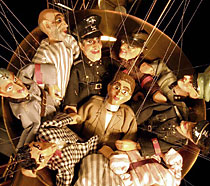The DUMBO-based Czechoslovak-American Marionette Theatre brings
the age-old Czech tradition of puppet theater to the Grand Army
Plaza Soldiers and Sailors Memorial Arch this fall with "The
Bass Saxophone."
Based on the short story by Josef Skvorecky, "The Bass Saxophone"
is adapted and directed by Vit Horejs, an émigré
of Prague who in 1990 founded the Czechoslovak-American Marionette
Theatre (CAMT).
"I grew up playing with a toy puppet theater. It was my
mother’s; she had played with it as a child," Horejs told
GO Brooklyn. "Throughout my childhood, I saw puppet theater."
"The Bass Saxophone" is just one of more than a dozen
works written by Skvorecky that deal with the fear and disdain
for music shared by oppressive rulers throughout the world. After
the Soviet Army overtook the Prague Spring of 1968, Skvorecky
fled to Toronto, where he later became a professor of literature
at Toronto University. His books include "The Cowards"
and "The Miracle Game"; his novel "Tank Battalion"
was adapted for Vit Olmer’s 1991 film of the same name.
Skvorecky’s "Bass Saxophone" tells the story of a group
of young jazz enthusiasts in 1944 German-occupied Czechoslovakia
who risk their lives by playing what Goebels called "decadent
Judeo-negroid music" (a.k.a. jazz).
One of the young men, an aspiring saxophone player and would-be
womanizer named Danny, catches a glimpse of a bass saxophone
being unloaded for a traveling German dance orchestra in front
of a decrepit hotel and is drafted into carrying the instrument
inside. In the labyrinthine hotel, he meets a bizarre Wehrmacht
band of crippled and deformed musicians who ask him to jam with
them – blending kitschy musical trash with Danny’s forbidden
swing tunes.
"It’s like he’s in a dream," says Horejs. "It’s
like a Bruegel or Bosch painting."
The characters in the play will be portrayed by live actors,
eight-inch marionettes (created by Prague designer Milos Kasal)
and four-foot papier-mâché direct-control musician
puppets created by Theresa Linnihan. The set is provided by Roman
Hladik and the Grand Army Plaza arch, a venue with a suitability
Horejs says he discovered purely by accident.
"One of our members, [Linnihan], helped to establish Puppeteer’s
Cooperative and its Puppet Library in one leg of the arch,"
said Horejs. "The other leg of the arch and the spiral staircase
are empty. When I saw the inside of the arch, something clicked.
The hotel setting was already there. Also the story is set during
a war and the arch commemorates a war victory [of the Union Army]."
"The Bass Saxophone" begins outdoors, under the arch,
and continues in the arch and up the staircase past tableaux
depicting the atmosphere of the time, to the transom where the
Wehrmacht musicians congregate on a canopy bed that transforms
into various story locations.
The action is accompanied by live music performed by Charles
Waters’ band; Waters is the musical director. The score includes
international swing standards from the period, improvised music
layered over the puppets’ and puppeteers’ actions and music written
for the play.
Although Horejs says he didn’t want to connect his story of German
Nazis with any current war, he concedes that when "talking
about the horrors of war there are connections that pop up."
In fact, Czech puppet theater, which traveled from village to
village, often made political references – sometimes to a village
scandal or local events and sometimes to the activities of the
current monarch. And during the days when Czechoslovakia was
behind the Iron Curtain created by the Soviets, marionette theater
was suppressed or co-opted, said Horejs.
In "The Bass Saxophone," the puppets symbolize the
state of humanity in wartime, when people are not masters of
their own fate and music provides the antidote.
"The little puppets sometimes serve as the soul of the characters,
who have inner monologues with them," says Horejs.
Skvorecky devoted most of his writings to his favorite topic,
jazz. (Horejs considers Danny to be Skvorecky’s alter-ego.) But
having lived under two oppressive regimes (Nazi and Communist),
he came to love music not only as entertainment but also as a
liberator of the human spirit. It is entirely appropriate that
Skvorecky’s play be produced under the shadow of a monument commemorating
the victory not only of the North over the South, but also of
freedom over slavery.
The Czechoslovak-American Marionette
Theatre presents "The Bass Saxophone" Sept. 30 through
Oct. 30, Fridays and Saturdays at 8 pm, Saturday and Sunday matinees
at 3 pm (except Oct. 1) at the Soldiers’ and Sailors’ Memorial
Arch, located at the Grand Army Plaza intersection across from
Prospect Park. (Previews are Sept. 30, Oct. 1-2.) All performances
are free, but donations are encouraged. Limited seating; reservations
recommended. Not recommended for children younger than 14. For
reservations, call (212) 868-4444 or visit www.SmartTix.com.

























